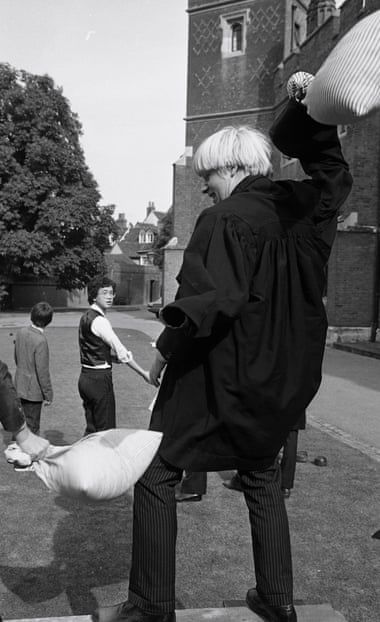
Britain’s overgrown Eton schoolboys have turned the country into their playground
Over the past fortnight, the news from Westminster has rather resembled a weird play about pre-revolutionary France, or Tsarist Russia circa 1916.
In some parts of the country, the rate of unemployment runs at 15%. Six million people are now reckoned to be on universal credit. I was in Birmingham this week, where I heard lots of talk about the impossibility of finding work, and local businesses hanging on by their fingernails. But every time I switched on the radio, I heard a twisted soap opera about money, taste (or the lack of it) and a prime minister who is reportedly having difficulty getting by on £150,000 a year. Boris Johnson’s alleged insistence that he was minded to “let the bodies pile high in their thousands” rather than impose another lockdown suggests a Bourbon or Romanov driven to exasperation by the necessity of difficult choices. There is something similarly monarchical about the swift binning of the £2.6m Downing Street briefing room – further proof, it seems, that austerity need only worry the plebs.
As with David Cameron’s lobbying efforts on behalf of the financier Lex Greensill in apparent pursuit of a multimillion-pound payday, this is essentially a story about privilege, and the shamelessness and insensitivities that come with it. More specifically, it centres on the renaissance of an archetype that has been nothing but trouble: the ambitious, dizzyingly confident public schoolboy, convinced of his destiny but devoid of any coherent purpose – and, once gifted with power, always on the brink of letting loose chaos and mishap.
 Boris Johnson at Eton in 1979.
Boris Johnson at Eton in 1979.
I have recently been reading One Of Them, the memoir of an Etonian education written by Musa Okwonga, a black British writer whose recollections of his time at school are full of sharp and seemingly unarguable observations. As well as exploring how matters of privilege intersect with those of race, he eloquently nails how time spent at Eton serves to harden the kind of attitudes and attributes that, as alumni of the same school, Cameron and Johnson both embody.
Eton has long provided potent lessons in elitism and how it works. Okwonga recalls prefects not being appointed by staff or elected by boys from their own year, but “chosen by the prefects in the year above. The result is that if a boy wishes to be socially prominent at school, there are only 20 people in the school whose approval he truly needs.” If most of Eton’s pupils are thereby deemed irrelevant, it is not hard to infer what this means for its most successful pupils’ view of the people beyond the school’s walls: Okwonga remembers them being nicknamed “lebs”. The real world seems to be all but superfluous: boarding schools, after all, are designed to operate in isolation from it.
Nonchalance, meanwhile, is carefully cultivated: “Visible effort is mocked at my school – the trick is to achieve without seeming to try.” And for Eton’s high-flyers, there is an additional secret of success that Okwonga boils down to a simple aphorism: “if they merely gain prestige, then personal popularity will follow.” As Johnson’s lonely rise to the top seems to prove, the trick is not to be clubbable, but to achieve power and influence as a means of then acquiring friends and admirers. And as you do so, rules and conventions – along with consistency – can be casually pushed aside. “Shamelessness is the superpower of a certain section of the English upper classes,” Okwonga writes. “They don’t learn shamelessness at Eton, but this is where they perfect it.”
In Cameron’s case, the mindset he imbibed at school was evident in his cruel pursuit of austerity for political ends and blithe promises that were quickly forgotten. He pledged “no more tiresome, meddlesome, top-down restructures” of the NHS and quickly launched one of his own; having styled himself as an environmentalist, he reportedly then told his aides to “get rid of all the green crap”. Even more mind-boggling is the speech he made in early 2010 about corporate lobbying: “We all know how it works. The lunches, the hospitality, the quiet word in your ear, the ex-ministers and ex-advisers for hire, helping big business find the right way to get its way … So we must be the party that sorts all this out.”
When he wasn’t “chillaxing”, Cameron tried to cover his lack of substance with a performative gravitas that sometimes verged on camp. Johnson, by contrast, seizes every opportunity to reduce politics to the absurd, and thereby makes the vacuum beneath him even more glaring. Without convictions or consistency you get a government based on serial lurching, from U-turn to U-turn and crisis to crisis, which sooner or later has massive consequences. Brexit, let us not forget, is a direct result of the latter-day dominance of politics by the privately educated.
Moroever, because that dominance symbolises a very English mixture of nostalgia, deference and recklessness, it is part of the reason why the UK is now pulling apart; indeed, the fact that Johnson has been so hare-brained about arrangements in Northern Ireland is a vivid case study in the perils of entrusting matters of the utmost fragility to people whose basic unseriousness is not just toxic, but extremely dangerous.
Part of the English disease is our readiness to ascribe our national disasters to questions of personal character. But the vanities of posh men and their habit of dragging us into catastrophe have much deeper roots. They centre on an ancient system that trains a narrow caste of people to run our affairs, but also ensures they have almost none of the attributes actually required. If this country is to belatedly move into the 21st century, this is what we will finally have to confront: a great tower of failings that, to use a very topical word, are truly institutional.











